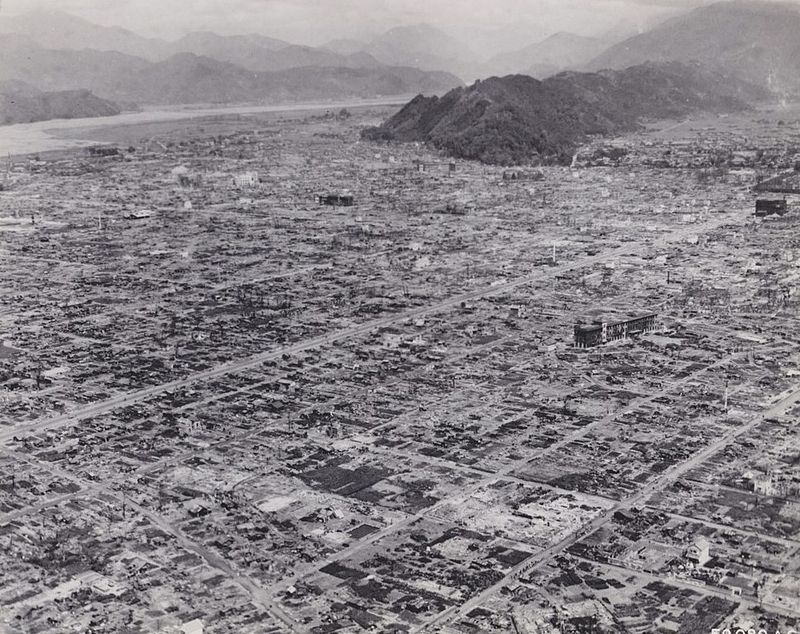You can find the usual hand-wringing reports, where (mainly) Japanese politicians proclaim that nuclear weapons should be eliminated.
Riiight. I'll stand with what I wrote six years ago (and five for Nagasaki).
The casualty rate for American forces fighting against the Japanese was over three times higher than those fighting the Germans. It was hot, hard, brutal work, for the Japanese contested almost every square foot of terrain. The Japanese had over two million men in their home islands and about a million more who were stranded in China, in large part due to the mining of the Sea of Japan. The Japanese war hawks believed that the Japanese could make an invasion so costly to the Allies that there would be a negotiated peace.* The idea that ten million or more Japanese might die didn't bother them a whit.
That a fleet of B-29s could and did burn entire cities to ashes didn't dent their resolve. This is what was left of Shizuoka after it was firebombed one night in June of 1945:
It was by no means the only city so razed. It didn't bother the Japanese high command that 200 B-29s could burn a city to the ground, with American losses mainly limited to mechanical failures and crashes.
Only the knowledge that the Americans could and would destroy an entire city with one bomb dropped from one airplane changed their minds. Only the realization that their country could be obliterated from the skies forced the Japanese military to give up the fight.
A world with atomic weapons is a dangerous one. But I submit that, as the first half of the last century showed, a world without them would be far more dangerous.
________________________________________________
* Japanese strategy from the beginning of the war was to tie up the Americans in a war of attrition and grind them down. That's not a bad move against a democratic state that requires popular support for wars. But it takes years to pull off. If the opponent has an easier time bearing the losses and if the opponent is also galvanized by perceived treachery and a desire for vengeance, well, good luck with that.
Wednesday weirdness
1 hour ago












10 comments:
Potentially 1,000,000 American fighting men's lives were saved. Nuff said...
http://nebris.tumblr.com/post/126034151343/no-apologies-no-regrets
A lot of Japanese lives were probably saved as well, judging from the massive civilian casualties on Okinawa.
Old NFO, one of them was likely my father and a few of my uncles, so I do have a dog in this one. (Another uncle would have been drafted if the war had gone on much longer.)
Some people project that many millions of Japanese would have died from
starvation alone between their limited crops and lack of import capability
at that point in the war.
Nukes were a terrible things but all the other solutions other than never
starting a war like that were far worse. If history ever showed us one
thing if you start a war and loose it will be bad.
One can also look at it as a painful but new start for japan where in
time they do become a world power.
Eck!
My take: When you start a war, you lose any moral authority to whine about how the war was ended.
'Nuff said.
If I remember correctly, the Japanese themselves were working on their own nuclear bomb until the Enola Gay put the project on hold.
Problem was, the United States' own Strategic Bombing Survey, back in the 1940s, determined that the nuclear bombs had minimal effect on Japan's decision to surrender.
Let's look at the timeline:
August 8: USSR declares war on Japan
August 15: Japanese government decides to surrender
The Red Army enters the fray, and, in just a week, the military rulers in charge of Japan decide to end the war -- even though they had spent years fighting the US and UK. Obviously, the entrance of the Soviet Union made the difference.
The above reasoning is the same that you're using. So which is it? The SBS -- again, a US military investigation just after the end of the war -- determined that Uncle Joe's decision to declare war on Japan caused Japan to surrender.
Makes sense. Vladivostok is on the sea of Japan, and the next island south of Sakhalin is Hokkaido. Furthermore, if the USSR gets control of Japan, the emperor himself is toast. Much better to take a chance with the US and UK -- at least they won't turn the country into a communist paradise.
Sam 240 is right : the nuclear bombs had minimal effect on Japan's decision to surrender.
They didn't want an unconditional surrender, they had one condition : that the Tenno (Emperor) keep his job. Given that, they folded.
But my point remains: You declare war on somebody, you do nasty things to civilians and POW's all over whether the Rape of Nanking or what happened in the Phillippines to our POW's, you lose all moral authority to whine about how the war got ended.
Regarding the Soviet invasion, it happened *after* the atomic bombs were dropped. The first bomb was dropped on August 6, the second bomb was dropped on August 8, the same day the Soviets declared war. The Soviet invasion started on August 9. The Soviet destruction of the Kwantung Army certainly helped convince the generals to surrender, but nobody could have known that this would be the case when the bombs were dropped. In any event, the totality of the circumstances are likely what led to the Japanese surrender, not any single event like the atomic bombs or the Soviet destruction of the Kwantung Army.
The next American bomb would have been dropped on August 18. It didn't happen, because Japan surrendered on August 15.
Post a Comment